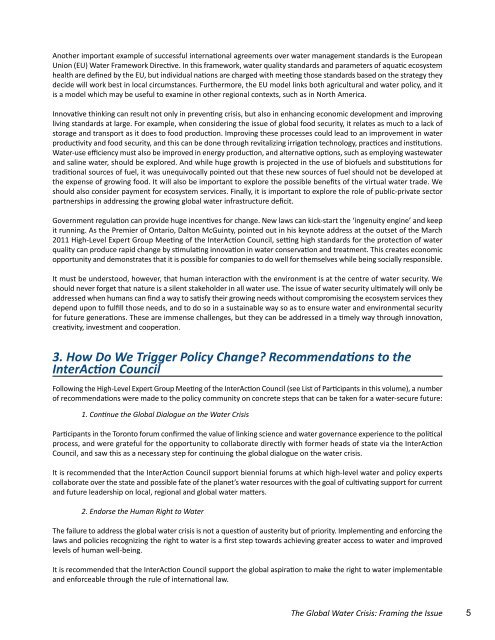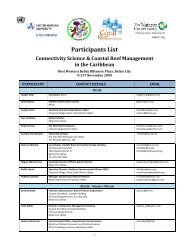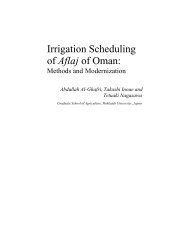The Global Water Crisis: Addressing an Urgent Security - Unu-inweh ...
The Global Water Crisis: Addressing an Urgent Security - Unu-inweh ...
The Global Water Crisis: Addressing an Urgent Security - Unu-inweh ...
You also want an ePaper? Increase the reach of your titles
YUMPU automatically turns print PDFs into web optimized ePapers that Google loves.
Another import<strong>an</strong>t example of successful international agreements over water m<strong>an</strong>agement st<strong>an</strong>dards is the Europe<strong>an</strong><br />
Union (EU) <strong>Water</strong> Framework Directive. In this framework, water quality st<strong>an</strong>dards <strong>an</strong>d parameters of aquatic ecosystem<br />
health are defined by the EU, but individual nations are charged with meeting those st<strong>an</strong>dards based on the strategy they<br />
decide will work best in local circumst<strong>an</strong>ces. Furthermore, the EU model links both agricultural <strong>an</strong>d water policy, <strong>an</strong>d it<br />
is a model which may be useful to examine in other regional contexts, such as in North America.<br />
Innovative thinking c<strong>an</strong> result not only in preventing crisis, but also in enh<strong>an</strong>cing economic development <strong>an</strong>d improving<br />
living st<strong>an</strong>dards at large. For example, when considering the issue of global food security, it relates as much to a lack of<br />
storage <strong>an</strong>d tr<strong>an</strong>sport as it does to food production. Improving these processes could lead to <strong>an</strong> improvement in water<br />
productivity <strong>an</strong>d food security, <strong>an</strong>d this c<strong>an</strong> be done through revitalizing irrigation technology, practices <strong>an</strong>d institutions.<br />
<strong>Water</strong>-use efficiency must also be improved in energy production, <strong>an</strong>d alternative options, such as employing wastewater<br />
<strong>an</strong>d saline water, should be explored. And while huge growth is projected in the use of biofuels <strong>an</strong>d substitutions for<br />
traditional sources of fuel, it was unequivocally pointed out that these new sources of fuel should not be developed at<br />
the expense of growing food. It will also be import<strong>an</strong>t to explore the possible benefits of the virtual water trade. We<br />
should also consider payment for ecosystem services. Finally, it is import<strong>an</strong>t to explore the role of public-private sector<br />
partnerships in addressing the growing global water infrastructure deficit.<br />
Government regulation c<strong>an</strong> provide huge incentives for ch<strong>an</strong>ge. New laws c<strong>an</strong> kick-start the ‘ingenuity engine’ <strong>an</strong>d keep<br />
it running. As the Premier of Ontario, Dalton McGuinty, pointed out in his keynote address at the outset of the March<br />
2011 High-Level Expert Group Meeting of the InterAction Council, setting high st<strong>an</strong>dards for the protection of water<br />
quality c<strong>an</strong> produce rapid ch<strong>an</strong>ge by stimulating innovation in water conservation <strong>an</strong>d treatment. This creates economic<br />
opportunity <strong>an</strong>d demonstrates that it is possible for comp<strong>an</strong>ies to do well for themselves while being socially responsible.<br />
It must be understood, however, that hum<strong>an</strong> interaction with the environment is at the centre of water security. We<br />
should never forget that nature is a silent stakeholder in all water use. <strong>The</strong> issue of water security ultimately will only be<br />
addressed when hum<strong>an</strong>s c<strong>an</strong> find a way to satisfy their growing needs without compromising the ecosystem services they<br />
depend upon to fulfill those needs, <strong>an</strong>d to do so in a sustainable way so as to ensure water <strong>an</strong>d environmental security<br />
for future generations. <strong>The</strong>se are immense challenges, but they c<strong>an</strong> be addressed in a timely way through innovation,<br />
creativity, investment <strong>an</strong>d cooperation.<br />
3. How Do We Trigger Policy Ch<strong>an</strong>ge? Recommendations to the<br />
InterAction Council<br />
Following the High-Level Expert Group Meeting of the InterAction Council (see List of Particip<strong>an</strong>ts in this volume), a number<br />
of recommendations were made to the policy community on concrete steps that c<strong>an</strong> be taken for a water-secure future:<br />
1. Continue the <strong>Global</strong> Dialogue on the <strong>Water</strong> <strong>Crisis</strong><br />
Particip<strong>an</strong>ts in the Toronto forum confirmed the value of linking science <strong>an</strong>d water govern<strong>an</strong>ce experience to the political<br />
process, <strong>an</strong>d were grateful for the opportunity to collaborate directly with former heads of state via the InterAction<br />
Council, <strong>an</strong>d saw this as a necessary step for continuing the global dialogue on the water crisis.<br />
It is recommended that the InterAction Council support biennial forums at which high-level water <strong>an</strong>d policy experts<br />
collaborate over the state <strong>an</strong>d possible fate of the pl<strong>an</strong>et’s water resources with the goal of cultivating support for current<br />
<strong>an</strong>d future leadership on local, regional <strong>an</strong>d global water matters.<br />
2. Endorse the Hum<strong>an</strong> Right to <strong>Water</strong><br />
<strong>The</strong> failure to address the global water crisis is not a question of austerity but of priority. Implementing <strong>an</strong>d enforcing the<br />
laws <strong>an</strong>d policies recognizing the right to water is a first step towards achieving greater access to water <strong>an</strong>d improved<br />
levels of hum<strong>an</strong> well-being.<br />
It is recommended that the InterAction Council support the global aspiration to make the right to water implementable<br />
<strong>an</strong>d enforceable through the rule of international law.<br />
<strong>The</strong> <strong>Global</strong> <strong>Water</strong> <strong>Crisis</strong>: Framing the Issue<br />
5




